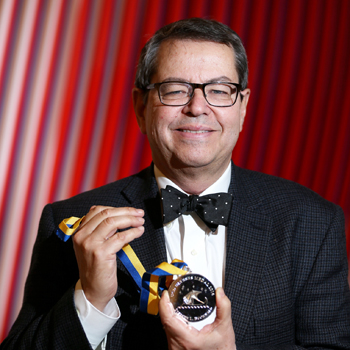One of the creative scientists who shaped the way that modern chemistry is undertaken, Professor Stephen L. Buchwald, MIT, has been awarded the UCD Ulysses Medal, the highest honour that University College Dublin can bestow. The award recognises his outstanding global contribution to the field of chemistry.
Inaugurated in 2005, the UCD Ulysses Medal is named in honour of University College Dublin’s most famous alumnus, James Joyce, who is widely regarded as the father of the modern novel and the most seminal author of the twentieth century.
“His [Professor Steve Buchwald’s] catalytic methods for the formation of C-C, C-N and C-F bonds and the selective transformations of small molecules, as exemplified in his excellent presentation this afternoon, have a major impact on synthetic chemistry with enormous applications in medicine and in industry,” said Prof Andrew J Deeks, President of UCD who presented the award.

Ulysses Medal recipient, Prof Stephen L. Buchwald
“He is a pioneer of ‘aryl amination’ a significant C-N bond-forming reaction using palladium catalysts and this reaction is named after him and Professor Hartwig who simultaneously reported their research in this field. He is one of the top cited organic chemists in the world, indeed one of the most influential. It is therefore a great honour to present the UCD Ulysses Medal to Professor Steve Buchwald,” he said.
Born in Bloomington, Indiana, Professor Buchwald received his BSc from Brown University in 1977 where he worked with Kathlyn A. Parker and David E. Cane at Brown University as well as Professor Gilbert Stork at Columbia University. In 1982, he received his PhD with Jeremy R. Knowles from Harvard University. He was then a postdoctoral fellow at Caltech with Nobel Laureate Professor Robert H. Grubbs. In 1984, he began as an assistant professor of chemistry MIT before being promoted to Associate Professor (1989), then to Professor (1993), and then named the Camille Dreyfus Professor (1997).
During his time at MIT he has received numerous honours including the 2013 Arthur C. Cope Award from the American Chemical Society. In 2000, he was elected as a fellow of the American Academy of Arts and Sciences and in 2008 he was elected as a member of the National Academy of Science. In 2014, he was the recipient of the Linus Pauling Medal Award. He currently has 526 publications with 44 issued patents, his work has been cited 49,316 times (his citations are >2,000 p.a. for past 10 years) and he has a h-index of 127.
Previous recipients of the UCD Ulysses Medal include: Anti-apartheid campaigner and former judge of first constitutional court in South Africa, Albie Sachs; world leading intellectual and political activist, Professor Noam Chomsky, MIT; Nobel prize-winning poet, Seamus Heaney; former US President, Bill Clinton; Irish playwright, Brian Friel; US philosopher, Professor Hilary Putnam; and founder and executive chairman of the World Economic Forum, Professor Klaus Schwab.
The award was presented at the Centre for Synthesis and Chemical Biology’s (CSCB) Annual Symposium which took place on the 12 December 2014. This year’s symposium was entitled “Recent Advances in Synthesis and Chemical Biology XIII”. The Centre for Synthesis and Chemical Biology is a collaboration in the chemical sciences between University College Dublin (UCD), Trinity College Dublin (TCD) and the Royal College of Surgeons in Ireland (RCSI). The centre was established in December 2001 through PRTLI Cycle 3 funding from the HEA and currently there are over 40 principal investigators and their research groups within the centre.
This symposium consists of five lectures given by internationally distinguished professors in the field of synthesis and chemical biology and has been held annually since 2002. In addition to the five lectures, a poster session is held where PhD students and postdoctoral fellows presents their research.